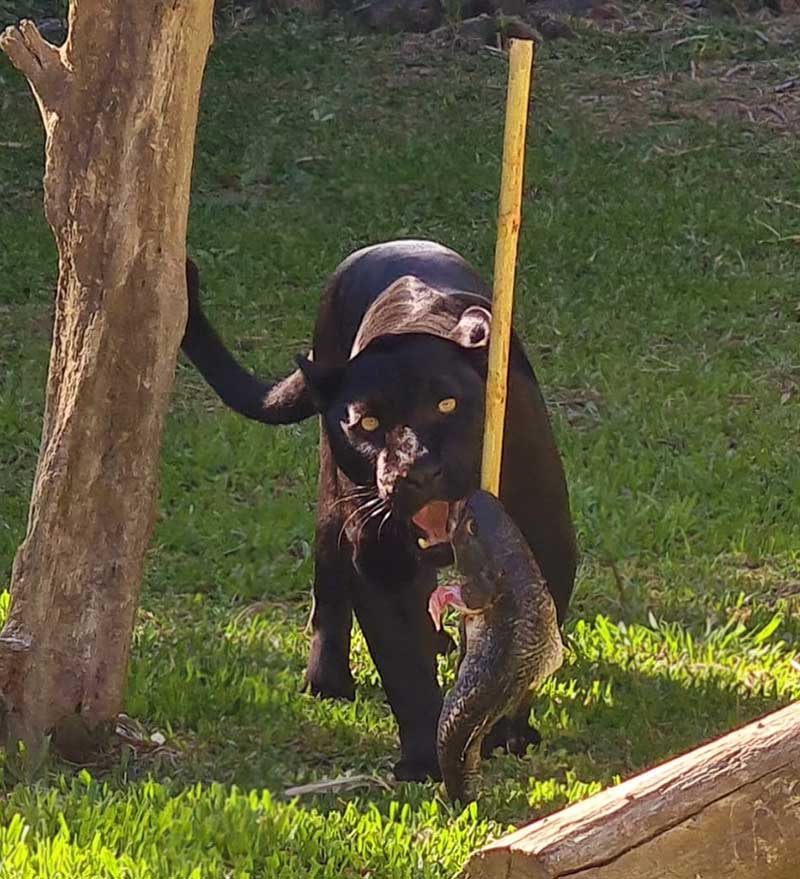The religious habit of eating fish on Good Friday inspired an Easter-themed activity at Gramadozoo. In March, the park received a donation of 85 kilos of fish seized by the 2nd Platoon of Environmental Military Police in Canela at the Divisa dam, in São Francisco de Paula. The fishermen were caught with 21 illegal nets totaling 870 meters in length.
Donated fish were used not only to feed various species at the zoo, but also for environmental enrichment. During Holy Week, a fish was placed on a skewer in the jaguar enclosure. The curious female sniffed the bait and quickly interacted with the proposed dynamic.

In the tayra enclosure, small pieces of fish with banana and honey were placed inside a coconut shell. The animal quickly found the treats. On the capuchin island, the primates became more suspicious and sniffed the fish a lot before eating. For the tuiuiú, fish bait contributed to the bird’s conditioning work.
“The main objective of the enrichment program is to maintain animal welfare”, says biologist Tathiana Gosaric. Visitors can follow the thematic activities until Sunday, the 9th.
In addition, fish are also important in the rehabilitation of species that are in the zoo’s hospital. “We have a clock falcon that arrived to be treated and we are using fish as basic food for him”, says veterinarian Jorge Lima.
Lieutenant Marco Antônio Ritter, commander of the Patram de Canela, warns that predatory fishing using nets and other prohibited items can cause ecological imbalance and even the extinction of species. “We will continue efforts to hold accountable those who commit crimes. The Salto System dams are used by families seeking contact with nature, and predatory fishing undermines this balance,” says Ritter.
The religious habit of eating fish on Good Friday inspired an Easter-themed activity at Gramadozoo. In March, the park received a donation of 85 kilos of fish seized by the 2nd Platoon of Environmental Military Police in Canela at the Divisa dam, in São Francisco de Paula. The fishermen were caught with 21 illegal nets totaling 870 meters in length.
Donated fish were used not only to feed various species at the zoo, but also for environmental enrichment. During Holy Week, a fish was placed on a skewer in the jaguar enclosure. The curious female sniffed the bait and quickly interacted with the proposed dynamic.

In the tayra enclosure, small pieces of fish with banana and honey were placed inside a coconut shell. The animal quickly found the treats. On the capuchin island, the primates became more suspicious and sniffed the fish a lot before eating. For the tuiuiú, fish bait contributed to the bird’s conditioning work.
“The main objective of the enrichment program is to maintain animal welfare”, says biologist Tathiana Gosaric. Visitors can follow the thematic activities until Sunday, the 9th.
In addition, fish are also important in the rehabilitation of species that are in the zoo’s hospital. “We have a clock falcon that arrived to be treated and we are using fish as basic food for him”, says veterinarian Jorge Lima.
Lieutenant Marco Antônio Ritter, commander of the Patram de Canela, warns that predatory fishing using nets and other prohibited items can cause ecological imbalance and even the extinction of species. “We will continue efforts to hold accountable those who commit crimes. The Salto System dams are used by families seeking contact with nature, and predatory fishing undermines this balance,” says Ritter.






